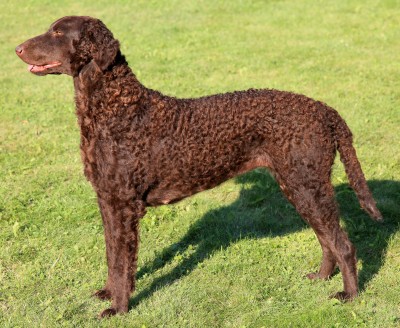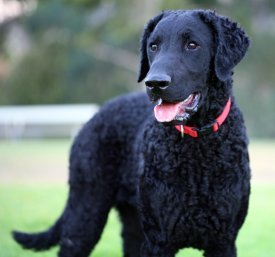Curly-Coated Retriever Health Care & Feeding
By Michele Welton, Dog Trainer, Breed Selection Consultant, Author of 15 Dog Books

Start your Curly-Coated Retriever off on the right foot by feeding the right food, giving the right vaccinations, finding the right vet, and if you're going to spay or neuter, don't do it too early.
Jump down to this list of
Curly-Coated Retriever Health Problems
Or check out my advice for raising a healthy Curly-Coated Retriever puppy or adult dog:
 Dog Health Care – The Sensible Way
Dog Health Care – The Sensible Way
Read my advice on daily health care so your Curly-Coated Retriever lives a long, healthy life and seldom needs to see the vet... [read more]
 3 Best Ways To Feed Your Dog Healthy Food
3 Best Ways To Feed Your Dog Healthy Food
You can dramatically increase your dog's chances of living a long, healthy life by feeding the right food. Cutting right to the chase, the best foods for your Curly-Coated Retriever are... [read more]
 A Quick Way To Make Homemade Dog Food
A Quick Way To Make Homemade Dog Food
Your Curly will love real chicken, turkey, beef, fish, eggs, yogurt, broccoli.... this is not just "people food" and I'll tell you why... [read more]
 5 Best Kibble and Canned Dog Foods
5 Best Kibble and Canned Dog Foods
Some are better than others, but I must be honest – I'm not a huge fan of dry or canned dog food. Here are my concerns... [read more]
 Vaccinations and Booster Shots: Needed or Not?
Vaccinations and Booster Shots: Needed or Not?
How many vaccinations does your Curly-Coated Retriever puppy really need? Does your adult dog need yearly booster shots? The vaccination guidelines have changed! Find out what some vets aren't telling you... [read more]
 Spaying Your Female Dog: Pros and Cons
Spaying Your Female Dog: Pros and Cons
Should your female Curly-Coated Retriever be spayed? Current research says, "The AGE at which you spay can be vitally important to your dog's future health." So what's the best age? [read more]
 Neutering Your Male Dog: Pros and Cons
Neutering Your Male Dog: Pros and Cons
Have you been told that you must neuter your male Curly? Current research shows that the issue is not so simple. Pet owners are not being told about some risks associated with neutering male dogs, especially neutering too early... [read more]
 Make Sure Your Vet is the Best!
Make Sure Your Vet is the Best!
Is your current veterinarian really the best choice for your dog? Here's how to tell... [read more]
 Assisi Loop Review
Assisi Loop Review
Does your Curly suffer from arthritis, hip dysplasia, disk disease, colitis? My honest review of a veterinary device you can use at home to reduce inflammation and pain. [read more]

Complete list of Curly-Coated Retriever health problems
The "Big Three" health problems in Curlies are hip dysplasia (pain and lameness), epilepsy (seizures), and heart disease – all very worrisome. Then eye diseases, especially cataracts.
Hip dysplasia is the orthopedic disease to watch out for. The Orthopedic Foundation of America evaluated the hip X-rays of 1200 Curly-Coated Retrievers and found 16% dysplastic. Osteochondritis also occurs in the breed.
Epilepsy and heart disease (subaortic stenosis and patent ductus arteriosus) are both serious concerns in Curlies.
Cataracts can appear at 2-4 years old. Also eyelid abnormalities (entropion and ectropion), eyelash abnormalities, corneal dystrophy, retinal dysplasia, persistent pupillary membranes, and occasionally progressive retinal atrophy (PRA).
Allergies cause itchy skin and often lead to bacterial skin infections (pyoderma). Another skin disease that can occur in Curly-Coated Retrievers is follicular dysplasia.
As with all deep-chested breeds, Curlies are at higher-than-normal risk for the emergency gastrointestinal syndrome called bloat.
Other health issues in Curly-Coated Retrievers include hypothyroidism and von Willebrand's blood-clotting disease.
Preventing health problems
Some health problems are inherited. For example, if your dog inherits from his parents the genes for an eye disease called PRA, he will go blind and there's nothing anyone can do about it.
 But most health problems can be prevented by the ways you raise your dog.
But most health problems can be prevented by the ways you raise your dog.
FREE eBOOK! My free online health care program, 11 Things You Must Do Right To Keep Your Dog Healthy and Happy shows you how to raise your Curly-Coated Retriever in all the right ways that help prevent health problems. Become your dog's health care champion!
My best-selling books – now available FREE on my website
 Respect Training For Puppies: 30 seconds to a calm, polite, well-behaved puppy is for puppies 2 to 18 months old. Your puppy will learn the 21 skills that all family dogs need to know. Click here to read for free.
Respect Training For Puppies: 30 seconds to a calm, polite, well-behaved puppy is for puppies 2 to 18 months old. Your puppy will learn the 21 skills that all family dogs need to know. Click here to read for free. Teach Your Dog 100 English Words is a unique Vocabulary and Respect Training Program that will teach your adult dog to listen to you and do what you say. Click here to read for free.
Teach Your Dog 100 English Words is a unique Vocabulary and Respect Training Program that will teach your adult dog to listen to you and do what you say. Click here to read for free. 11 Things You Must Do Right To Keep Your Dog Healthy and Happy helps your dog live a longer, healthier life. Get my honest advice about all 11 Things before you bring home your new puppy, because some mistakes with early health care cannot be undone. Click here to read for free.
11 Things You Must Do Right To Keep Your Dog Healthy and Happy helps your dog live a longer, healthier life. Get my honest advice about all 11 Things before you bring home your new puppy, because some mistakes with early health care cannot be undone. Click here to read for free.

